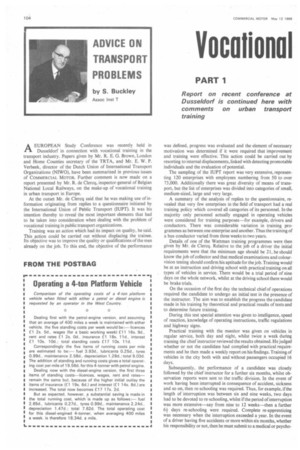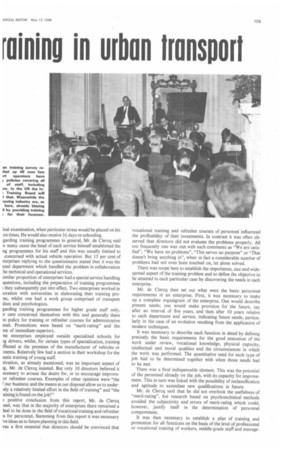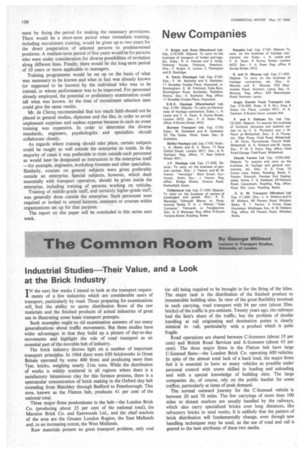Vocational raining in urban transport
Page 106

Page 107

Page 108

If you've noticed an error in this article please click here to report it so we can fix it.
PART "I
Report on recent conference at Dusseldorf is continued here with comments on urban transport training
AEUROPEAN Study Conference was recently held in Dusseldorf in connection with vocational training in the transport industry. Papers given by Mr. R. E. G. Brown, London and Home Counties secretary of the TRTA, and Mr. E. W. P. Verbe,ek, director of the Dutch Union of International Transport Organizations (NIWO), have been summarized in previous issues of COMMERCIAL MOTOR. Further comment is now made on a report presented by Mr. R. de Clercq, inspector-general of Belgian National Local Railways, on the make-up of vocational training in urban transport in Europe.
At the outset Mr. de Clercq said that he was making use of information originating from replies to a questionnaire initiated by the International Union of Public Transport (IUPT). It was his intention thereby to reveal the most important elements that had to be taken into consideration when dealing with the problem of vocational training in public transport organizations.
Training was an action which had its impact on quality, he said. This action could be carried out without displacing the trainee. Its objective was to improve the quality or qualifications of the men already on the job. To this end, the objective of the performance was defined, progress was evaluated and the element of necessary motivation was determined if it were required that improvement and training were effective. This action could be carried out by resorting to internal displacements, linked with detecting promotable individuals and the evaluation of potential.
The sampling of the IUPT report was very extensive, representing 120 enterprises with employees numbering from 50 to over 73,000. Additionally there was great diversity of means of transport, but the list of enterprises was divided into categories of small, medium-sized, large and very large.
A summary of the analysis of replies to the questionnaire, revealed that very few enterprises in the field of transport had a real training policy which covered all categories of its personnel. In the majority only personnel actually engaged in operating vehicles were considered for training purposes—for example, drivers and conductors. There was considerable variation in training programmes as between one enterprise and another. Thus the training of a bus conductor varied from three weeks to two years.
Details of one of the Wattman training programmes were then given by Mr. de Clercq. Relative to the job of a driver the initial requirements were that the minimum age should be 21, he should know the job of collector and that medical examinations and colourvision testing should confirm his aptitude for the job. Training wouldbe at an instruction and driving school with practical training on all types of vehicles in service. There would be a trial period of nine days on the whole network, whilst at the driving school there would be brake trials.
On the occasion of the first day the technical chief of operations required the candidate to undergo an initial test in the presence of the instructor. The aim was to establish the progress the candidate made in his training by theoretical and practical results of tests and to determine future training.
During this test special attention was given to intelligence, speed of reaction, knowledge of operating instructions, traffic regulations and highway signs.
Practical training with the monitor was given on vehicles in regular service, both day and night, whilst twice a week during training the chief instructor reviewed the results obtained. He judged whether or not the candidate had complied with practical requirements and he then made a weekly report on his findings. Training of vehicles in the city both with and without passengers occupied 16 days.
Subsequently, the performance of a candidate was closely followed by the chief instructor for a further six months, whilst observation reports were sent to the traffic division. In the event of work having been interrupted in consequence of accident, sickness and so on, then re-schooling was required. Thus, for example, if the length of interruption was between six and nine weeks, two days had to be devoted to re-schooling, whilst if the period of interruption was more extensive—say from nine to 12 weeks—then a further 6+ days re-schooling were required. Complete re-apprenticing was necessary when the interruption exceeded a year. In the event of a driver having five accidents or more within six months, whether his responsibility or not, then he must submit to a medical or psycho ical examination, when particular stress would be placed on his on times. He would also receive 3+ days re-schooling.
garding training programmes in general, Mr. de Clercq said n many cases the head of each service himself established the rig programmes for his staff and this was usually limited to concerned with actual vehicle operation. But 15 per cent of iterprises replying to the questionnaire stated that it was the rind department which handled the problem in collaboration he technical and operational services.
>imilar proportion of enterprises had a special service handling questions, including the preparation of training programmes t they subsequently put into effect. Two enterprises worked in ioration with universities in elaborating their training prone, whilst one had a work group comprised of transport dists and psychologists.
garding training programmes for higher grade staff only, Ncent concerned themselves with this and generally there to policy for training or refresher courses for administrative nnel. Promotions were based on "merit-rating" and the ins of immediate superiors.
ne enterprises employed outside specialized schools for ig drivers, whilst, for certain types of specialization, training ffected at the premises of the manufacturer of vehicles or 3nents. Relatively few had a section in their workshop for the natic training of young staff.
tivation, as already mentioned, was an important aspect of Mr. de Clercq insisted. But only 10 directors believed it ecessary to arouse the desire for, or to encourage improveor refresher courses. Examples of other opinions were "the r our business and the means at our disposal allow us to undernly a relatively limited effort in the field of training" and "the aining is found on the job!"
positive conclusion from this report, Mr. de Clercq ued, was that in the majority of enterprises there remained a ieal to be done in the field of vocational training and refresher for personnel. Stemming from this report it was necessary ye ideas as to future planning in this field.
vas a first essential that directors should be convinced that 'vocational training and refresher courses of personnel influenced the profitability of their investments. In contrast it was often observed that directors did not evaluate the problems properly. All too frequently one was met with such comments as "We are satisfied", "We have no problems", "This serves no purpose" or "That doesn't bring anything in", when in fact a considerable number of problems had not even been touched on, let alone solved.
There was scope here to establish the importance, size and widespread aspect of the training problem and to define the objective to be attained in each particular case by discovering the needs in each enterprise.
Mr. de Clercq then set out what were the basic personnel requirements in an enterprise. First, it was necessary to make up a complete organigram of the enterprise. One would describe present needs: one would make provision for the future, say after an interval of five years, and then after 10 years relative to each department and service, indicating future needs, particularly in the case of an evolution resulting from the application of modern techniques.
It was necessary to describe each function in detail by defining precisely the basic requirements for the good execution of the work under review, vocational knowledge, physical capacity, intellectual and moral qualities and the circumstances in which the work was performed. The quantitative need for each type of job had to be determined together with when those needs had to be met.
There was a final indispensable element. This was the potential of the personnel already on the job, with its capacity for improvement. This in turn was linked with the possibility of reclassification and aptitude to assimilate new qualifications in future.
Mr. de Clercq said that he did not overlook the usefulness of "merit-rating", but research based on psychotechnical methods avoided the subjectivity and errors of merit-rating which could, however, justify itself in the determination of personnel comportment.
It was then necessary to establish a plan of training and promotion for all functions on the basis of the level of professional or vocational training of workers, middle-grade staff and manage ment by fixing the period for making the necessary provisions. There would be a short-term period when immediate training. including recruitment training, would be given up to two years for the direct preparation of selected persons to predetermined positions. A medium-term period of five years would be for persons who were under consideration for diverse possibilities of evolution along different lines. Finally, there would be the long-term period of 10 years or more applicable to managers.
Training programmes would be set up on the basis of what was necessary to be known and what in fact was already known (or supposed to be known) by the individual who was to be trained, or whose performance was to be improved. For personnel already employed, the potential or preliminary examination could tell what was known. At the time of recruitment selection tests could give the same results.
Mr. de Clercq recommended that too much faith should not be placed in general studies, diplomas and the like, in order to avoid unpleasant surprises and useless expense because in such an event training was expensive. In order to determine the diverse standards, engineers, psychologists and specialists should collaborate closely.
As regards where training should take place, certain subjects could be taught as well outside the enterprise as inside. In the majority of cases it was preferable to train outside such personnel as would later be designated as instructors in the enterprise itself —for example, engineers, workshop foremen and other specialists. Similarly, courses on general subjects were given preferably outside an enterprise. Special subjects, however, which dealt essentially with transport operation, should be given inside the enterprise, including training of persons working on vehicles. Training of middle-grade staff, and certainly higher-grade staff, was generally done outside the enterprise. Such personnel were required or invited to attend lectures, seminars or courses within organizations set up for that purpose.
The report on this paper will be concluded in this series next week.




















































































































































